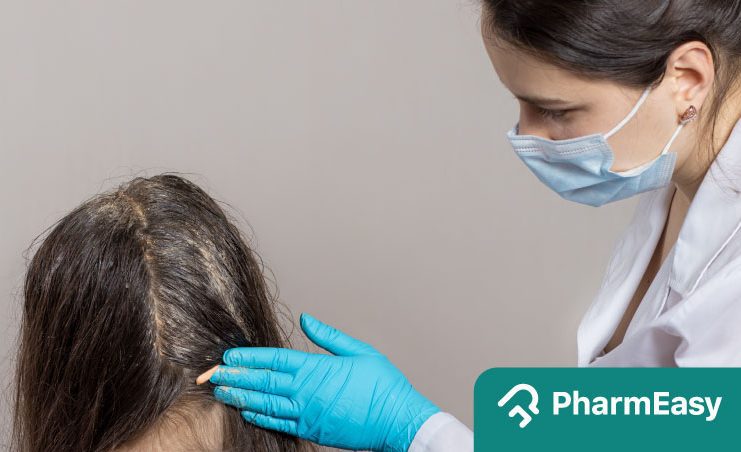Everything You Need To Know About Scalp Psoriasis
By Dr. Nikita Toshi +2 more

Get,

to manage your symptom
Get your,


4 Cr+ families
benefitted

OTP sent to 9988776655



You’ve successfully subscribed to receive
doctor-approved tips on
Whatsapp

Get ready to feel your best.

Hi There,



Register to Avail the Offer
Send OTPBy continuing, you agree with our Privacy Policy and Terms and Conditions

Hi There,

Trusted by 4 crore+ families

OTP sent to 9988776655



You have unlocked 25% off on medicines




Code: NU25

By Dr. Nikita Toshi +2 more
Table of Contents
One of the most commonly affected areas of psoriasis, scalp psoriasis, is an autoimmune disorder where raised, scaly and itchy plaques are seen on the scalp.

Scalp psoriasis can either appear in patches or can affect the entire scalp. In some cases, the disorder can spread to the hairline, the upper neck and inside the ear.
Psoriasis on the head is not contagious and you can’t catch this disorder from someone else. In an autoimmune disorder, the skin cells grow faster than usual and form patches on the head.
In some cases, scalp psoriasis is mild and unnoticeable, but there are also severe cases where it lasts longer and creates crusted sores. Excessive itching can cause skin infections and hair loss.
Scalp psoriasis should not be confused with dandruff and ignored. Scalp psoriasis is usually associated with discolouration of skin. You’ll notice red patches with silvery scales.
Dr. M.G. Kartheeka, MBBS, MD

Scalp psoriasis symptoms can range from mild to severe.
In the case of mild scalp psoriasis, the symptoms are fine but with slight scaling.
For moderate and severe cases, scalp psoriasis symptoms include:
In some cases of hair fall, the hair may grow back once the skin clears up, but in other cases, one may notice a permanent thinning of hair.
You may need to treat your scalp differently in the morning and evening. This can make treatment more effective and help reduce side effects.
Dr. Ashish Bajaj – M.B.B.S, M.D.

Consult a dermatologist for the evaluation and treatment of your condition. Based on the overall analysis of your health and severity, your doctor will prescribe you treatment that can include-
Topical creams and lotions– scalp psoriasis treatment may include medicated shampoos, gels, lotions, creams, soaps or ointments that you have to apply directly on the scalp. Some of these are easily available over the counter, but you may require a doctor’s prescription for others.
In the case of moderate to severe cases of scalp psoriasis, the treatments can vary. The doctor might prescribe the following:
Corticosteroids are the most frequently prescribed treatment for scalp psoriasis in children and adults, these along with medicated shampoos work quickly to reduce redness, swelling, itch, and scaling.
Dr. Ashish Bajaj – M.B.B.S, M.D.

There are some natural scalp psoriasis treatments that are popular but do not assure improvement for everyone. Some of these popular home remedies to reduce scalp psoriasis symptoms are-
Also Read: Dandruff Vs Dry Scalp: Recognizing the Difference and Treatment Options

It can be difficult to resist the urge to itch, but there are certain tips that you can follow to manage the effects of scalp psoriasis.
As the exact causes of scalp psoriasis causes are unknown to us, it is often difficult to prevent the disorder. Hence, it is important to receive the correct treatment as soon as the symptoms appear.
The disorder affects people differently; hence identifying and avoiding the triggers of scalp psoriasis is the best way to keep this autoimmune disorder at bay.
Also Read: Why Does My Hair Get Greasy So Fast: Unraveling the Causes and Fixes
Disclaimer: The information included on this site is for educational purposes only and is not intended to be a substitute for medical treatment by a healthcare professional. Because of unique individual needs, the reader should consult their physician to determine the appropriateness of the information for the reader’s situation.

Leave your comment...
Comments